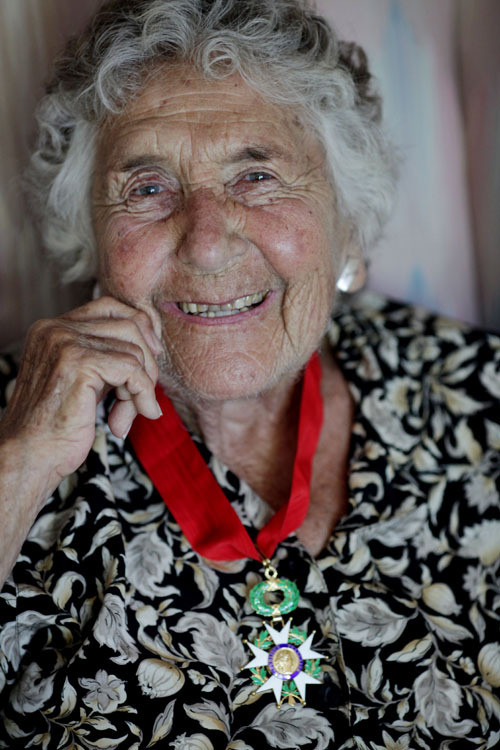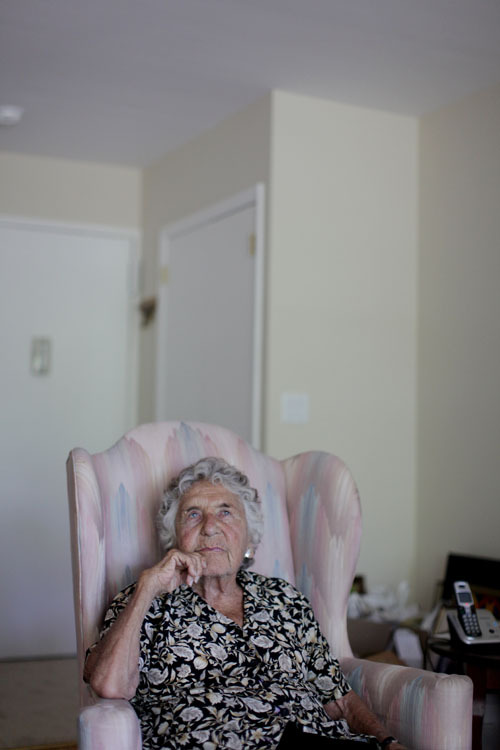Hunting the hunters: Resistance hero of Great Neck honored
By Michael Orbach
Issue of July 2, 2010/ 20 Tammuz, 5770Renee Wiener fought back.
In the summer of 1944, Wiener was 19, a slim brunette with long legs and greenish brown eyes. She, her parents and her sister had fled Vienna several years earlier and settled in the free zone of Nice in the south of France. Like other Jews, they feared raids and deportations but managed by word of mouth to avoid them. In the quiet early years of the war, Wiener belonged to the Eclaireuses et Eclaireurs israélites de France, the Jewish Scouts, a youth group that, along with several other Jewish groups, evolved into a resistance movement.
"The people who let their parents hold them back, I still remember their names," recalled Wiener, 86. "There was tremendous peer pressure. It was so much easier than trembling in the basement waiting for the Gestapo to knock on the door. It's a lot easier to try to do something."
On September 11, 1943, German soldiers raided the Busby, the hotel where Wiener's family was staying. Wiener, her mother and her sister, were running late and arrived at the hotel in time to see the Germans seal it off to conduct the raid. Her father, not so fortunate, was arrested and deported along with 30,000 other refugees in Nice. That was the last time she saw him. After her father's abduction, Wiener saw to it that her mother and sister were placed in a safe house - the top floor of a small hotel - while she went underground and dedicated herself fully to the Armee Juvie, The Jewish Army, an amalgamation of several groups.
Her unit was 14 teenagers on the cusp of adulthood. They communicated clandestinely with each other and each night slept in a different safe house around the city. Their missions ranged from finding families to house Jewish children, to carrying weapons, sabotaging transport lines and forging food stamps. There was also one task that Wiener disliked more than any other: "Taking care of informers."
"They tracked down hidden people, families who were in cellars, and sold them to the Gestapo at a set price for a head," Wiener explained. "They were the lowest of the low."
When the Jewish Army would find an informer they would mail him a hand-made miniature casket. If the collaborator persisted, the women in the Jewish Army would go to a bar the collaborator frequented. There, the women would strike up a conversation with the collaborator and invite him back to an isolated motel. The combat division of the Jewish Army would be waiting.
"It was not very easy," Wiener says, "but not very difficult either, especially in France when you're 18" during the war. She continued: "You had no human compassion for them. We did warn them. They had to be eliminated. But I never participated. You have to have a strong stomach even if you believe in it."
Other girls in the unit were better at it than she, Wiener said.
In order to prevent leaks, when members of the Jewish Army transported weapons to the French Resistance, the carriers were told nothing about what they were carrying or to whom they were delivering. Once, while crossing from one train to another carrying a heavy suitcase she later learned was filled with explosives, a German soldier stopped her. Wiener held her breath, but the soldier didn't search the luggage. Instead he offered to help the pretty girl carry her bags to her connecting train.
"I nearly died but he gave it back," Wiener remembered almost 70 years later. "He was very courteous."
While carrying weapons on another occasion Wiener saw a roadblock up ahead where German soldiers were searching all luggage. She turned around and began hitchhiking back. A German troop transport pulled up next to her and the troops offered her a ride back to town.
Wiener relied on her intuition to find safe houses for Jewish families. She fondly recalled days spent` traveling in the mountains in the south of France, sleeping under the stars. She'd strike up conversations with people in restaurants or bars and gauge whether or not they'd be willing to keep children safe.
"Southern France was not that favorable [in] attitude towards us by and large," Wiener explained. "We found some, but not that many and you couldn't count on the general public. You had to be very careful. "
Once a possible safe haven was located the group had to face the next challenge: convincing parents to let their children be hidden.
"[That] wasn't always easy," Wiener recalled. "A bunch of teenagers they didn't know to give up their children to? But they didn't make it and the children did."
Some children were placed in convents, the most memorable of which, Wiener recalls, was a convent for Carmelite nuns who took a vow of silence.
"That created problems for the kids," Wiener said. "Young children in an environment where no one talked?"
On one of her visits to the order Wiener brought a bouquet of flowers to the Mother Superior. The nun, the only one in the convent who had not taken a vow of silence, explained to Wiener that she couldn't accept the flowers since they would provide too much worldly pleasure.
Wiener's most frequent companion during those days was Bernard Fall, a brave 16-year-old orphan.
"During the first couple of years he saw me romantically but there was never anything that could happen during the service, especially in the safe houses," Wiener said.
Fall eventually joined the French Resistance and later became a prominent American war correspondent.
"After the war he tried very hard not to be a Jew," Wiener said. "He joined the Combats De' France and became a Frenchman. Why he needed to do that I don't know. He didn't want to be a refugee Jew."
In 1967 Fall was killed when he stepped on a landmine while reporting on the Vietnam War.
Toward the summer of 1944, Wiener was sent to Annemasse, on the Swiss border. From there she and other members of The Jewish Army smuggled children over the mountains to Switzerland. German forces killed her friend Marianne Cohn during one such operation across the border. The children survived thanks to the intervention of the mayor of Annemasse, Jean Deffaugt, who has since been recognized by Yad Vashem in Jerusalem as one of the Righteous among the Nations.
The war ended for Wiener in June of 1944 when the French Resistance liberated Annemasse. She moved to Belgium with her mother and sister and worked there using a fake passport. Years later, she arrived on American shores and has been living in Great Neck for the last 12 years. Reading about the war, Wiener says she was surprised to find out just how large the Jewish element was in the French Resistance; she knew only the members of her group.
In May of this year, Wiener was given the Legion of Honor, France's highest civil or military award.
"Madame, may you continue to be a model of courage to your grandchildren and our own, a force and inspiration to guide their path in the world of today and tomorrow," the French consul said. "Because our debt to you cannot be paid by remembrance alone. The example you set must also inspire us in the future. The best tribute we can pay you is to prove ourselves worthy of what you achieved for us."
An Austrian student wanted to write a book about Wiener but she is hesitant. One of her young grandsons was present at the ceremony at the French Consul.
"He thought I single-handedly threw down the atom bomb and saved all Europe," Wiener said. "I explained that it wasn't so, and that it was a very long time ago and we were all teenagers." But most amazing to the six-year-old was that his grandmother had ever been a teenager.

 44.0°,
Mostly Cloudy
44.0°,
Mostly Cloudy 







